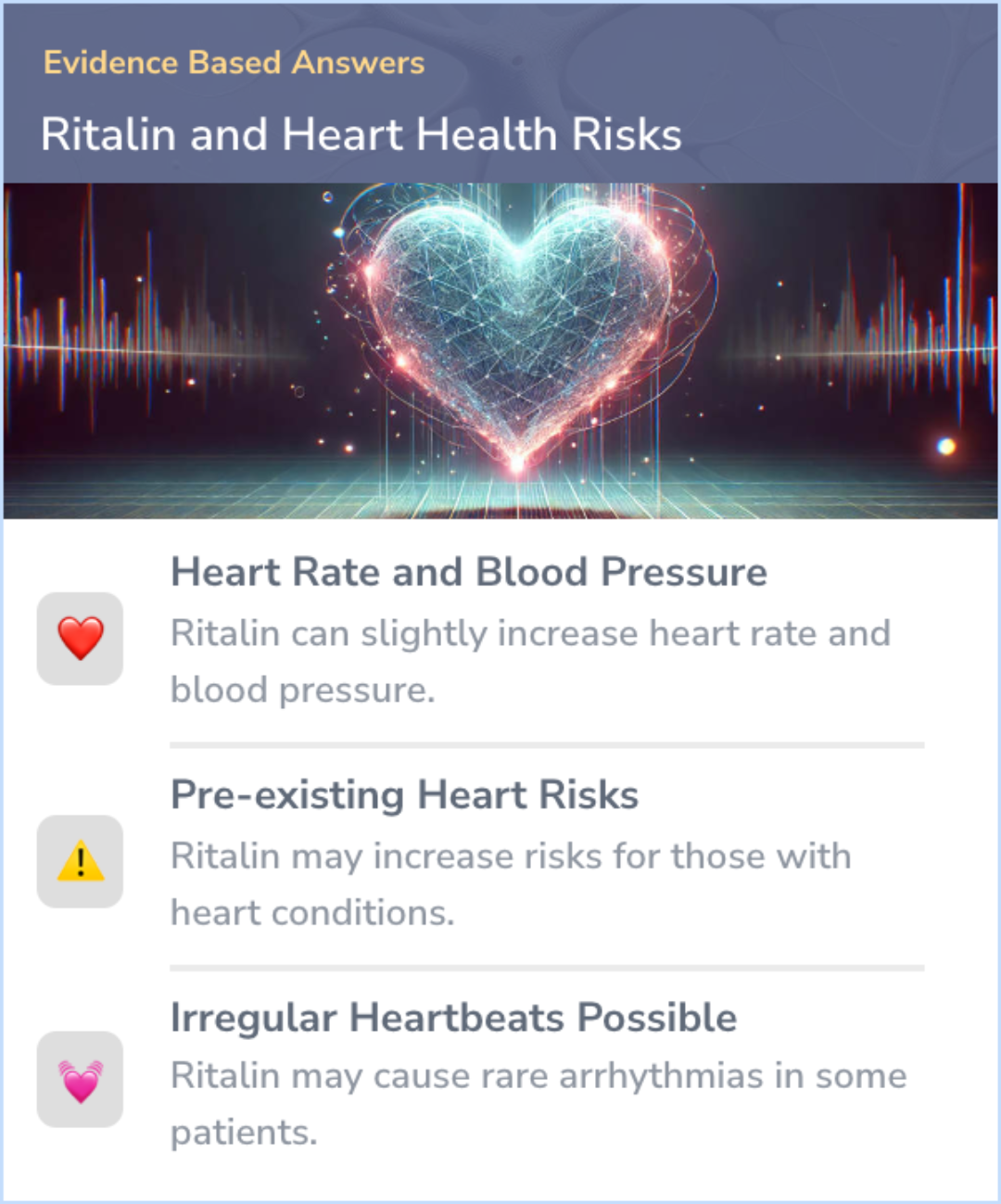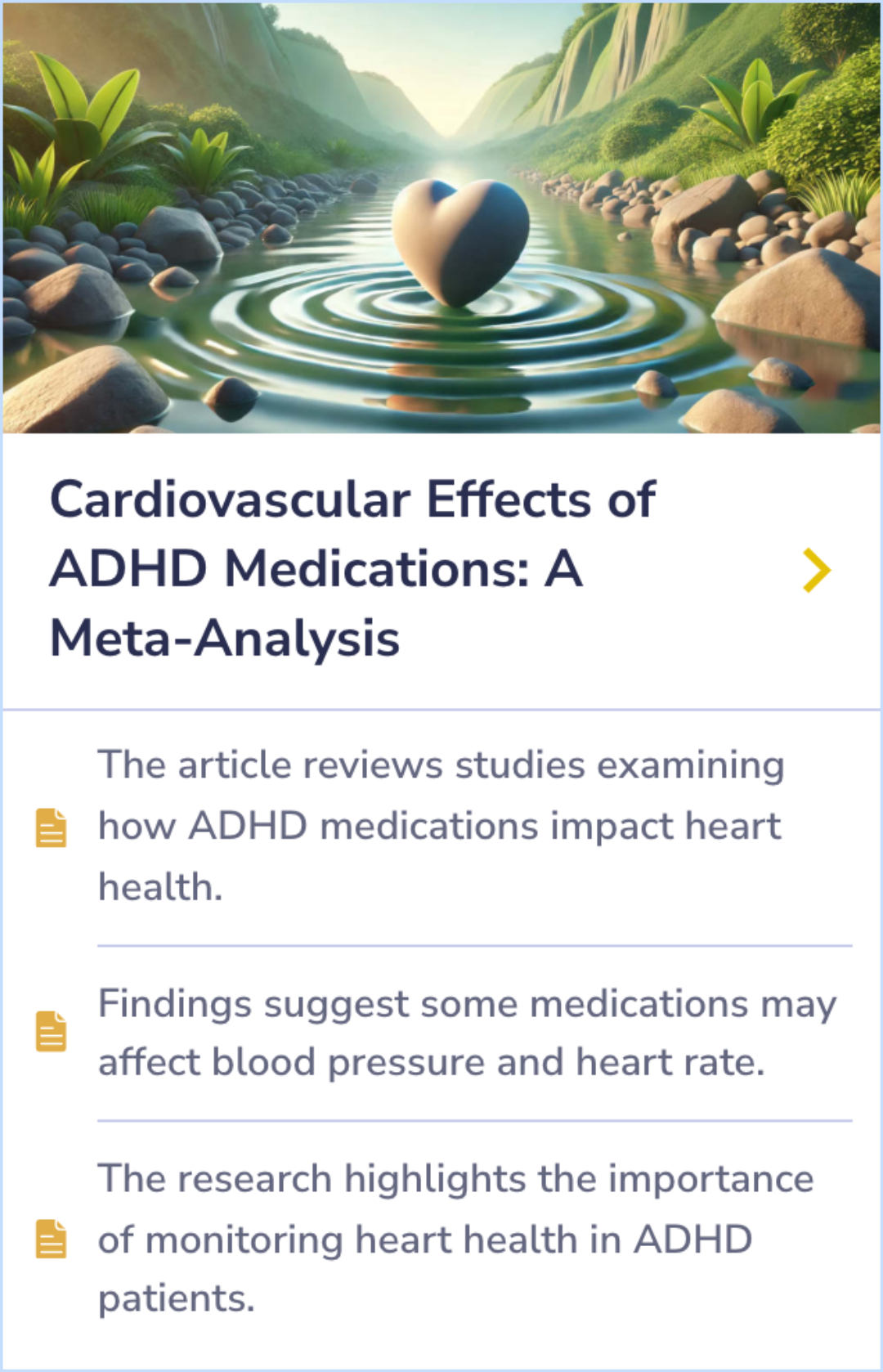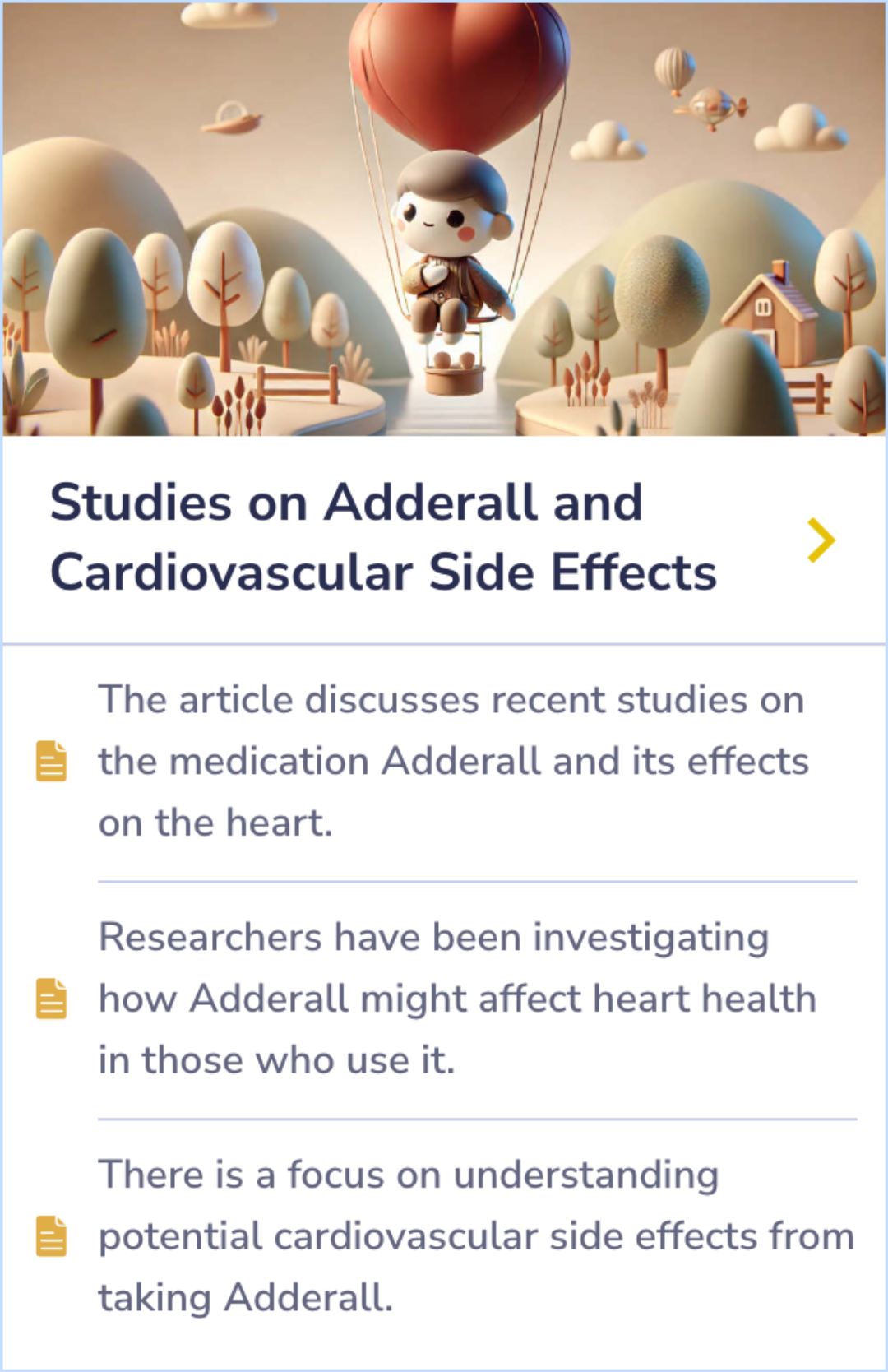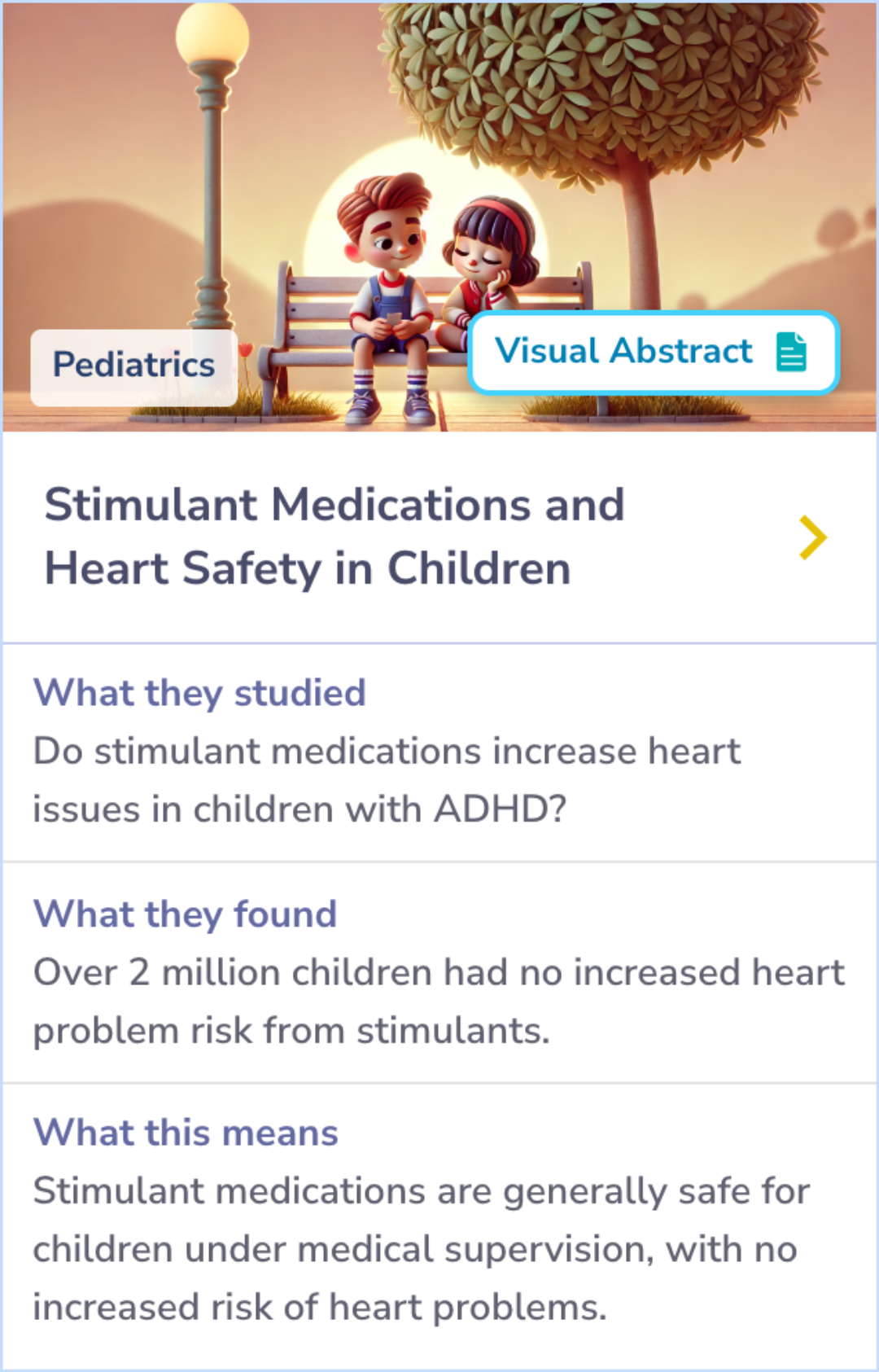Ritalin
Evidence Based Answers
Can Ritalin cause an irregular heartbeat?
Taking Ritalin without ADHD for neuroenhancement can heighten health risks, especially concerning cardiovascular health, and demands cautious use under medical supervision.
Published: November 5, 2024
Click to explore a section:

Ritalin use may slightly increase heart rate, pose risks for those with heart conditions, and rarely cause arrhythmias.
Background: Cardiovascular Warnings
Stimulant medications like Ritalin may increase blood pressure and heart rate. This suggests that users might experience changes in cardiovascular function, potentially leading to an irregular heartbeat.
Adults on stimulants could face stroke or heart attack risks, and children with pre-existing heart issues might be at risk of sudden death. Monitoring and medical advice are recommended if symptoms such as chest pain or fainting occur.
Adults on stimulants could face stroke or heart attack risks, and children with pre-existing heart issues might be at risk of sudden death. Monitoring and medical advice are recommended if symptoms such as chest pain or fainting occur.
Background: Heart Rhythm Concerns with Ritalin
Ritalin, often prescribed for ADHD, can affect the cardiovascular system. Cases of cardiac arrhythmia (irregular heartbeat) have been reported, though they are generally rare. For individuals with structural heart problems, the risk may be higher.
People with known heart rhythm abnormalities or serious heart conditions are advised to avoid stimulant medications like Ritalin, which could help minimize adverse heart-related effects.
People with known heart rhythm abnormalities or serious heart conditions are advised to avoid stimulant medications like Ritalin, which could help minimize adverse heart-related effects.
“
Source Quotes:
Other reactions include hypersensitivity; anorexia; nausea; dizziness; palpitations; headache; dyskinesia; drowsiness; blood pressure and pulse changes, both up and down; tachycardia; angina; cardiac arrhythmia.
Due to the risk of such fatal side effects, it is advisable to avoid methylphenidate in patients with a structural cardiac abnormality, cardiomyopathy, or arrhythmias.
Background: Risks of Serious Heart Events in High-Risk Individuals
In people with heart conditions, stimulant medications like Ritalin can increase the risk of serious cardiovascular issues. Cases of sudden death, heart attacks, and stroke have been reported, especially in those with existing cardiac issues.
Because of these risks, Ritalin is not recommended for individuals with structural heart problems or rhythm disorders, as these conditions may make them more prone to adverse heart effects.
Because of these risks, Ritalin is not recommended for individuals with structural heart problems or rhythm disorders, as these conditions may make them more prone to adverse heart effects.
“
Source Quotes:
Stimulant products generally should not be used in patients with known structural cardiac abnormalities, cardiomyopathy, serious heart rhythm abnormalities, coronary artery disease, or other serious heart problems.
Stroke and myocardial infarction also have been observed in adults. Due to the risk of such fatal side effects, it is advisable to avoid methylphenidate in patients with a structural cardiac abnormality, cardiomyopathy, or arrhythmias.
Background: Variability in Heart Rate Responses with Ritalin
Ritalin may lead to changes in heart rate, which can vary significantly from person to person. Some individuals experience slight increases, while others see more noticeable changes. For most, these changes are mild, but they may be concerning for those with heart conditions.
Heart rate increases can be unpredictable, and regular heart rate monitoring is often recommended for Ritalin users, especially for those with hypertension or heart failure, where even small increases could have implications.
Heart rate increases can be unpredictable, and regular heart rate monitoring is often recommended for Ritalin users, especially for those with hypertension or heart failure, where even small increases could have implications.
“
Source Quotes:
Stimulant medications cause a modest increase in average blood pressure (about 2 to 4 mm Hg) and average heart rate (about 3 to 6 bpm), and individuals may have larger increases.
The increases in heart rate were also quite variable and ranged between 28% and 83%.
Background: Signs of Heart Issues During Ritalin Treatment
In rare cases, Ritalin may cause symptoms that suggest a heart issue, like chest pain, fainting, or shortness of breath. These could indicate changes in heart rhythm or rate, particularly concerning for those with heart conditions.
If these symptoms occur, seeking medical attention is advised to rule out serious heart-related effects. A healthcare provider may adjust the treatment plan to ensure safety, especially for those at higher risk of cardiovascular issues.
If these symptoms occur, seeking medical attention is advised to rule out serious heart-related effects. A healthcare provider may adjust the treatment plan to ensure safety, especially for those at higher risk of cardiovascular issues.
“
Source Quotes:
Patients who develop symptoms such as exertional chest pain, unexplained syncope, or other symptoms suggestive of cardiac disease during stimulant treatment should undergo a prompt cardiac evaluation.
If a patient complains of cardiac symptoms, such as chest pain, that worsens with exertion or has a near-syncope episode, then a full cardiac workup should be performed.
Key Takeaways
Conclusions
Stimulant medications like Ritalin can slightly increase heart rate and blood pressure. However, these changes can be more significant for individuals with pre-existing heart conditions.
Studies and guidelines suggest that individuals with such conditions face higher risks of severe cardiovascular events. Monitoring heart health is crucial, especially if symptoms such as arrhythmias appear, as they can indicate a risk of irregular heartbeat caused by Ritalin.
Studies and guidelines suggest that individuals with such conditions face higher risks of severe cardiovascular events. Monitoring heart health is crucial, especially if symptoms such as arrhythmias appear, as they can indicate a risk of irregular heartbeat caused by Ritalin.

Evidence Summary
How ADHD Medications Affect Heart Health
ADHD medications can impact heart health, with research showing changes in blood pressure and heart rate in some cases. These medications may elevate or lower these measures, depending on factors like dosage and individual response.
Research emphasizes the need for regular cardiovascular monitoring in ADHD patients, as these adjustments can help manage any potential risks tied to medication use.
Research emphasizes the need for regular cardiovascular monitoring in ADHD patients, as these adjustments can help manage any potential risks tied to medication use.
Evidence Summary
How Adderall May Impact Heart Health
Research on Adderall raises concerns about how the medication may influence heart health, specifically the potential for cardiovascular side effects. Researchers are looking closely at how these effects might present in individuals who regularly take Adderall.
Several studies investigate whether using Adderall could impact aspects of heart function, with attention to those who might experience increased risks.
The focus is on possible side effects like irregular heart rhythms and other cardiovascular responses in those on this medication.
Several studies investigate whether using Adderall could impact aspects of heart function, with attention to those who might experience increased risks.
The focus is on possible side effects like irregular heart rhythms and other cardiovascular responses in those on this medication.
Evidence Summary
Comparing Cardiac Safety of ADHD Stimulants in Youth
This study tracked over two million children with ADHD to compare cardiac event risks between two common stimulant medications. Using data from Medicaid, researchers followed young users of methylphenidate and amphetamine salts to monitor emergency room visits for heart-related symptoms.
After accounting for health history, the findings showed that current users of either stimulant had no higher risk for cardiac issues than past users, indicating similar safety profiles for these medications.
After accounting for health history, the findings showed that current users of either stimulant had no higher risk for cardiac issues than past users, indicating similar safety profiles for these medications.


